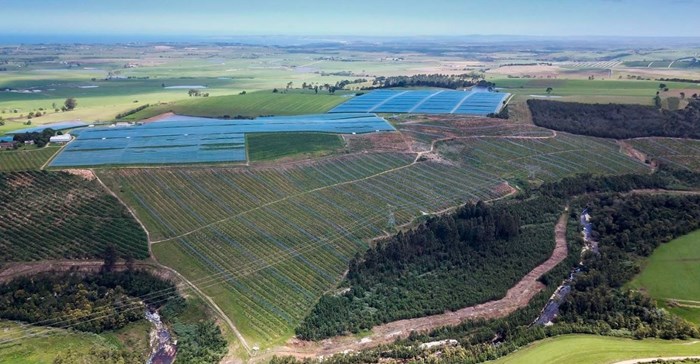When many people hear the term ‘business rescue’ they immediately think the worst – that the business is no longer financially viable or that all its assets are in a state of disrepair. “However, this is not always the case,” says Wesley Cowan, director for Galetti Corporate Real Estate.

Source: Supplied. Blue Mountain Berries, a profitable and fully operational berry and avocado farm just outside of George that is being sold via sealed bid after being placed in business rescue.
“Entering business rescue is a commonly used pathway for companies in financial distress to reorganise and restructure their assets to maximise the likelihood of being able to continue operations and repay its creditors,” Cowan says.
In many cases, the business will choose to sell off lucrative assets that it owns, such as properties, in the process of financial restructuring. “These properties are often well-maintained and excellent investment opportunities, available at a lower price point because of the owner’s desire for a quick sale.”
Cowan points to Blue Mountain Berries, a profitable and fully operational berry and avocado farm just outside of George that is being sold via sealed bid after being placed in business rescue.
“Blue Mountain Berries is a strategically located farm with a long history of supplying to major grocers like Pick ‘n Pay, Checkers and Woolworths as well as being a major exporter to overseas markets in search of the farm’s top-quality produce. It being sold under business rescue has no bearing on its profitability or the state of its facilities.”
However, the mechanics of buying a property in business rescue differs slightly from that of a traditional sale.
Business rescue property purchase
When companies enter business rescue, a Business Rescue Practitioner (BRP) is appointed to draw up a business rescue plan that balances the rights and interests of all relevant stakeholders during the financial restructuring process. This often includes the sale of the business’ immovable property to pay creditors.
“Only the BRP may enter into any agreement whereby the entity chooses to sell a property,” explains Cowan. “The property conveyancer will need proof of the BRP’s appointment and a copy of the business rescue plan to show that the sale is in accordance with it.”
The new owner will be protected from any outstanding municipal debt associated with the property and once the sale is agreed upon by the BRP, it functions as a normal commercial property transaction. “In the case of Blue Mountain Berries farm sale, we have worked closely with the BRP to ensure that all necessary protective measures have been taken to ensure the best possible outcome for both the buyer and seller,” adds Cowan.
“As such, we anticipate a multitude of competitive offers from savvy investors who recognise the opportunity presented by this valuable asset prior to the 30 November 2023 deadline for sealed bids.”
The pros and cons
Naturally, there are both advantages and disadvantages of buying a property in business rescue, which Cowan unpacks as follows:
“The primary advantage here is with regards to pricing, as the BRP is invested in concluding the transaction in the shortest possible time frame and therefore more likely to consider a wider range of offers. This increases the likelihood of securing an asset at a discounted price point as opposed to a similar property that is not in business rescue.”
Cowan also highlights that in many cases, properties in business rescue come fully kitted out with the BRP looking to ‘sweeten the deal’ for the new owner. “For instance, Blue Mountain Berries comes complete with farmhouses, equipment, staff accommodation, a community centre, fully operational cold rooms as well as packing and storage facilities. There’s also the option to purchase a robust inventory list of moveable assets.”
Megan Baker, Thys Scheepers & Adelin Dalais,
Cox Yeats 26 Jul 2023 Properties in business rescue offer a huge amount of versatility, as the new owner has the opportunity to either continue a legacy or view it as a blank canvas and start from scratch.
As to the ‘cons’, the largest one, especially for new investors who want to pick-up where the previous owners left off in terms of continuing operations, may be overcoming the negative stigma associated with business rescue.
“Investors who’ve capitalised on the attractive price point and other advantages of this kind of property and are wondering ‘what next?’ should take the time to understand its operating structure and scrutinise its history to understand what mistakes may have been made previously, and what they can do differently going forward,” shares Cowan.
“However, in the current market, strategically located properties with a profitable history like Blue Mountain Berries don’t come around often - and are rarely offered to investors with a business-rescue discount. Breaking down the stigma of what this term means will go a long way in opening the market for savvy buyers looking to capitalise on versatile commercial-property opportunities,” he concludes.





































